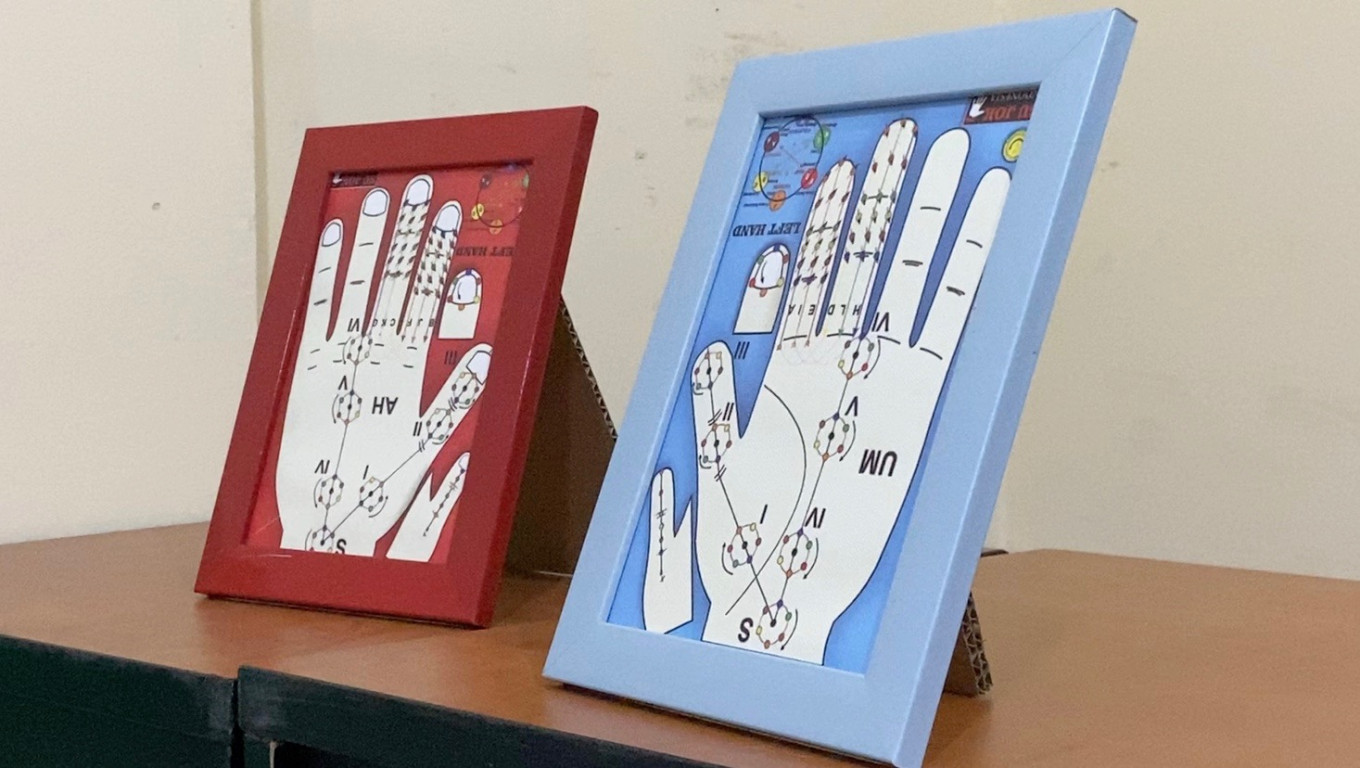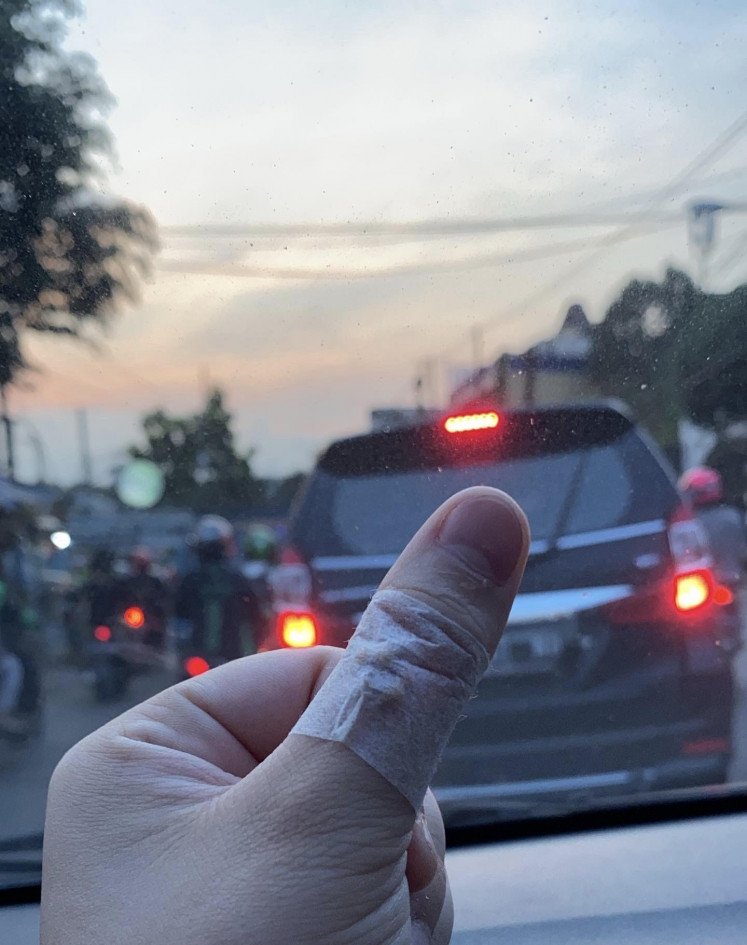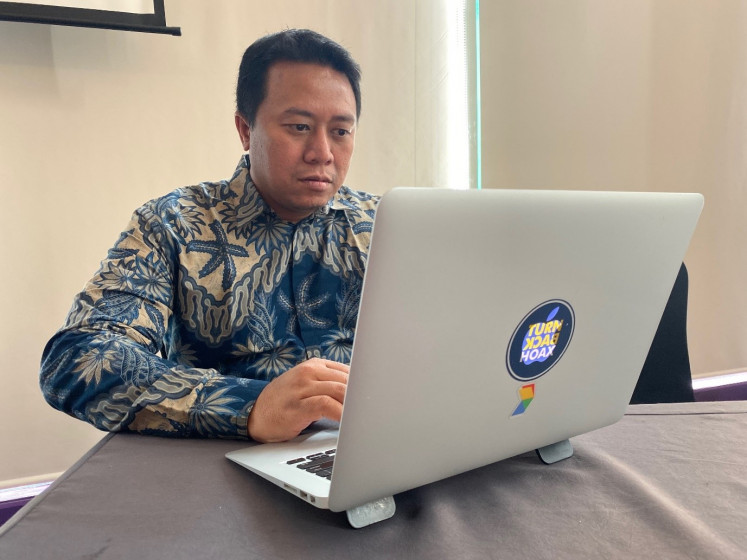Popular Reads
Top Results
Can't find what you're looking for?
View all search resultsPopular Reads
Top Results
Can't find what you're looking for?
View all search resultsWhy you should never google your symptoms or how to treat them
Change text size
Gift Premium Articles
to Anyone
M
edical professionals exist for a reason, yet most people rely on the internet to diagnose their illnesses with no regard whatsoever for their safety.
In a small clinic adjoining a medicinal herb shop, tucked away just outside Jakarta, a young woman sat as she had buckwheat seeds taped to her thumb. She had read on the internet that, according to Indonesia’s leading sujok practitioner Heriza “Heri” Budiman, it would cure her migraines.
Bamboozled: Some tape seeds to their thumb to cure headaches, but there is no evidence to show it works. (JP/Alana Riley)Sujok is an alternative therapy originating in Korea, and only recently arrived in Indonesia.
Heri said sujok used colors, seeds or magnets on the hands to trigger certain reactions across the body. The alternative therapy recently went viral after a Facebook post circulated, encouraging parents to use it to cure their child’s fever.
While the viral post stimulated interest in sujok therapy, thus indirectly promoting Heri’s new clinic, he was concerned that the message being spread did not contain all the facts.
Advising people against taking normal medication could be harmful and is not part of sujok practice, he emphasized. He also advocated the use of sujok within a combination of therapies.
“This is only one treatment method. You can use all the methods not only sujok,” he said.
“It’s complimentary, not absolute.”
In Indonesia, there are endless internet and social media messages for alternative therapy promising to cure everything from a stiff neck to more serious diagnoses like cancer or stroke.
University of Indonesia neurology lecturer Pukovisa “Visa” Prawiroharjo knows first-hand how dangerous internet-based medical advice can be.
One of the many dangerous claims circulating on the internet is that blood-letting can cure strokes. People believe that if they prick their finger until it bleeds, this will release pressure in their brain and fix the stroke.
“With strokes, you need to come to the hospital very early,” Visa said.
“But many of our patients come too late.”
There have been cases of patients dying as a result.
With no research into exactly how many people turn to natural therapy first, Visa said it was time for studies into this topic, expressing a conviction that it was definitely putting lives at risk.
Many Indonesian communities still have a strong relationship with natural medicines that predate the acknowledgement of modern medicine.
“Many people believe herbs or natural remedies give them a feeling of getting well from a disease,” Visa said.
Visa falls into that category himself. Some natural therapies that were used on him as a child, he still uses today for comfort.
Safety and efficacy are therefore the two most important aspects to consider when looking at a new medical therapy.
“Some traditional treatments have been around for hundreds of years […] checked by research to say they are safe and effective,” Visa said.
Some natural treatments, such as ginger for nausea, have been proven. Newer therapies, however, usually have not been and Visa warns that people should be skeptical of them.
Skepticism alone, however, is not enough, according to the Indonesian Anti-Defamation Society (Mafindo), a fact-checking organization that has tackled hoaxes since 2015.
The head of Mafindo’s fact-checking committee, Aribowo Sasmito, said as much work as the group did, it would always come down to the digital savviness of the people reading the hoaxes.
Get it right: Fact-checker Aribowo Sasmito said the only solution to fight health-related hoaxes online was education. (JP/Alana Riley)“Our job is limited to ‘these are the facts and this is the reason why we call it a hoax’,” Aribowo said.
While the group does its best to fact check as many hoaxes as possible, the clarified information will always be shared much less than the original disinformation.
There is no quick fix to the health-related hoax problems.
Mafindo believes in a multifaceted approach to combating hoaxes, two main focuses are education and law enforcement.
“Whenever we talk about regulation, people will instantly react with ‘you are trying to limit my freedom of speech’,” Aribowo said.
“The best solution is the painful and slow process of education […] change people’s mindset.”
Alana Riley traveled to Indonesia with the support of the Australian government’s New Colombo Plan Mobility Program.













